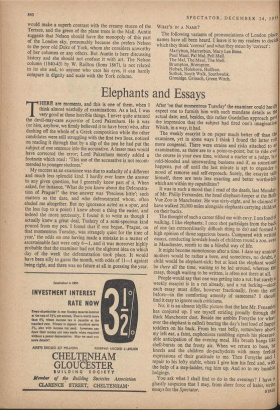Elephants and Essays
THERE are moments, and this is one of them, when I think almost wistfully of examinations. As a lad, I was very good at these horrible things. I never quite attained the devil-may-care expertise of Lord Pakenham. He it was (or him, anyhow, we firmly believed it to have been) who, after dashing off the whole of a Greek composition while the other candidates were still struggling with the first two lines, noticed on reading it through that by a slip of the pen he had put the subject of one sentence into the accusative. A lesser man would have corrected the error; Lord Pakenham merely added a footnote which read : 'This use of the accusative is not recom- mended to younger students.'
My success as an examinee was due to audacity of a different and much less splendid kind. I hardly ever knew the answer to any given question, but I generally knew part of it. When asked, for instance, 'What do you know about the Defencstra- tion of Prague?' the true -answer was `Precious little'; such matters as the date, and ,who defenestrated whom, often eluded me altogether. But my ignorance acted as a spur, and the less (up to a point) I knew about a thing the easier, and indeed the more necessary, I found it to write as though I actually knew a great deal. Tushery of a semi-specious kind poured from my pen. I found that if one began, 'Prague, on that momentous Tuesday, was strangely quiet for the time of year,' the odds on one having made a mistake in a matter of ascertainable fact were only 6-1, and it was moreover highly probable that the examiner had not the slightest idea on which day of the week the &fenestration took place. It would have been silly to guess the month, with odds of 11-1 against being right, and there was no future at all in guessing the year. After 'on that momentous Tuesday' the examiner could hardly expect one to furnish him with such mundane details as the actual date; and, besides, this rather Guedallan approach gave the impression that the subject had fired one's imagination. Which, in a way, it had.
The weekly essayist is on paper much better off than the examinee, yet in some ways I think I found the latter role more congenial. There were strains and risks attached to se examination, as there are to a point-to-point; but to ride over the course in your own time, without a starter or a judge, 10 cold-blooded and unrewarding business and if, as sometimes happens, put off until the last minute is apt to engender 0 mood of remorse and self-reproach. Surely, the essayist tells himself, there are tests less exacting and better worthwhile which are within my capabilities?
It was in such a mood that I read of the death, last MondaY, of Mr. Philip Fernandez, the head elephant-keeper at the Belle Vue Zoo in Manchester. He was sixty-eight, and he claimed to have walked 20,000 miles alongside elephants carrying children on their backs. The thought of such a career filled me with envy. I am fond of walking. I like elephants; I once shot partridges from the back of one (an extraordinarily difficult thing to do) and formed 0 high opinion of those sagacious beasts. Compared with writing essays, conducting howdah-loads of children round a zoo, eve in Manchester, seems to me a blissful way of life.
It might become monotonous after a time. I dare say anxious mothers would be rather a bore, and sometimes, no doubt, e, child would be elephant-sick; but at least the elephant would be there all the time, waiting to be led around, whereas the essay, though waiting to be written, is often not there at all.
People would say that one was getting into a rut; but surely 0 weekly essayist is in a rut already, and a rut lacking—since each essay must differ, however fractionally, from the ose, before—in the comforting amenity of sameness? I should find it easy to ignore such criticisms. No; it is an almost idyllic picture that the late Mr. Fenandee has conjured up. I see myself striding proudly through the thick Manchester dust. Beside me ambles Forsythe (or what' ever the elephant is called) bearing the day's last load of hapcY toddlers on his back. From his vast belly, somewhere above my left ear, a faint, euphonious rumbling signals his pleasure' able anticipation of the evening meal. His breath hangs like shell-bursts on the frosty air. When we return to base, he kneels and the children de-pachyderm with many feeling expressions of their gratitude to me. Then Forsythe and I repair to his lofty stable, where I give him his feed and, with the help of a step-ladder, rug him up. And so to my humble lodgings.
You ask what I shall find to do in the evenings? I have 0 ghastly suspicion that I may, from sheer force of habit, write










































 Previous page
Previous page